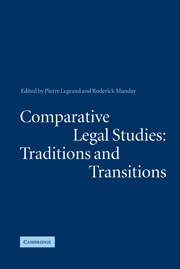Book contents
- Frontmatter
- Contents
- List of contributors
- Introduction
- Comparative legal studies and its legacies
- 2 The universalist heritage
- 3 The colonialist heritage
- 4 The nationalist heritage
- 5 The functionalist heritage
- Comparative legal studies and its boundaries
- Comparative legal studies and its theories
- Comparative legal studies and its futures
- Conclusion
- Index
3 - The colonialist heritage
Published online by Cambridge University Press: 18 December 2009
- Frontmatter
- Contents
- List of contributors
- Introduction
- Comparative legal studies and its legacies
- 2 The universalist heritage
- 3 The colonialist heritage
- 4 The nationalist heritage
- 5 The functionalist heritage
- Comparative legal studies and its boundaries
- Comparative legal studies and its theories
- Comparative legal studies and its futures
- Conclusion
- Index
Summary
The ‘word’ and the ‘world’
Notions of ‘heritage’, no matter howsoever nuanced, privilege certain moments of domination as inaugural. Implied in these notions are constitutive ideas about historic time flattened by certain orders of narrative hegemony. Who fashioned the colonial heritage, with what means of violence and exclusion, what elements were constitutive of ‘its’ core and who ‘received’ it, which aspects of ‘it’ were imposed by force and who resisted ‘it’ and how, are questions that, once posed, open up vistas of heterogeneity of historic time and space that we symbolize by the words ‘colonial’/‘post-colonial’. The matter of ‘winners’ and ‘losers’ forces our attention to the shifting character of the calculus of interests that animated the imposition and/or the ‘reception’ of metropolitan legality as well as patterns of resistance. The missing middle term between traditions and transitions (the thematic of this book) is transactions. The addition of this ‘dangerous supplement’ enables a more differentiated understanding of the sources of violence inherent in patterns of the dominant historiography that silence the voices of the subordinated.
Genres of comparative legal studies determine what may be meaningfully said concerning ‘the’ colonial inheritance. The positivistic genre of comparative legal studies strictly addresses forms of normative and institutional diffusion of dominant global legality. Instrumentalist approaches, principally the Old and the now ‘New’ law-and-development genre, remain concerned with issues of efficient management of transition from ‘non-’ modern to modern law.
- Type
- Chapter
- Information
- Comparative Legal Studies: Traditions and Transitions , pp. 46 - 75Publisher: Cambridge University PressPrint publication year: 2003
- 42
- Cited by



